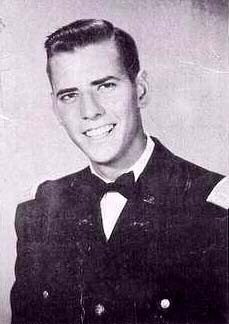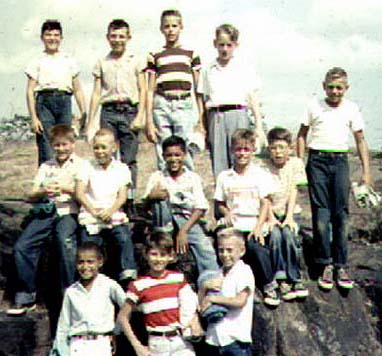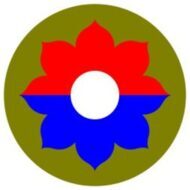A Company, 4th Battalion, 47th Infantry, 2nd Brigade Bien Hoa Province – May 9, 1967
Alpha Company | Page 1 | Page 2
Memorial provided by Milt Estralla
I was a member of A Company, 4th/47th from Basic Training, May of 1966, at Fort Riley, Kansas until I was wounded in the Mekong Delta, Viet Nam on July 11, 1967. As RTO to our Company Commander, Captain Fredrick Brazee, I was privileged to know all of the Platoon Leaders. I didn’t know Lt. Rybicki very well as he joined our Company after we arrived in Viet Nam. However, I do remember the day very well that he lost his life. We were patrolling for Viet Cong in the infamous Rung Sat Special Zone in very sticky mud. I was about 30 yards away when a single shot rang out. We were under the jungle canopy and the medevac chopper was extracting Lt. Rybicki by cable and I saw his body just go limp. I found the following article about Lt. Rybicki and his West Point classmate, good friend and future brother-in-law, Lieutenant Terry Stull.

Tribute To My Good Friend, by Dino Barkema…..
Frankie, I still miss you Buddy. You are not forgotten. I remember when we used to play steal the bacon in the field by your house in Rousseau. When you fell from the Nance tree and broke your arm. I remember all of us playing in the jungle and having a good old time. I remember how much time you spent taking care of your little brother. I also remember you as the young Teddy Roosevelt in a play at the Balboa Theater. I remember you in your ROTC uniform with your shiny sword hanging by your side. You used to mix Channel #5 with your shoe polish to get your shoes looking like glass. You connected suspenders to the tail of your shirt and connected the other end to your socks so that when you bent over and straightened back up again your shirt tail would go back into place. Then you became head of ROTC on both sides of the Canal Zone. I remember when you became “General For A Day” in the Canal Zone for writing an essay about what “Memorial Day Means To Me”. I never got a chance to read that essay.
I remember when you went to West Point. I was a PFC in Germany and as a Lieutenant you still took the time to write to your friend. I was still in Germany when you left West Point for Vietnam. The last letter I got from you was from West Point. Then I got the news that you had been killed in Vietnam. My Mom sent me the news clipping from the Panama American. I couldn’t believe it. You were not suppose to die so soon. Then I read the story about you in News Week magazine. They named a street after you in Cardenas, Frank. I hope Panama does not change the name of that street. Ten years after you died I went and visited with your folks. Your Mom gave me a picture of you. Then your Dad broke down and started crying. He really did love you Frank. Some of our other friends are gone now too, Frank. What is left of the old Rousseau gang still keep the memories alive and keep you all in our hearts. Thanks for being my friend.

Photo taken approximately 1956 and was provided by Ned Kennington to Dino Barkema. There’s young Frank Rybicki (in the brown striped shirt) with his classmates where he grew up in the town of Rousseau, Panama Canal Zone. Rousseau was built specifically for a hospital during World War II and was torn down in 1962.
The youngster just below Frank, Jose Bibbo, also served in Viet Nam – he passed away at an early age which resulted from his combat experiences with the 82nd Airborne Division. On the right of Jose is John Grow and then Ned Kennington. Barry Blackard is to the left of Frank and David Kimberling is on the right side of Frank.
Jose Bibbo is buried at the Corozal Military Cemetary in the former Panama Canal Zone. Frank Rybicki is buried at West Point’s Cemetary.
Middle row, far left is Jackie Bittle. Bottom row, far left is John Malene. Bottom row, far right is Richard Sherman.
THIS ARTICLE WAS TAKEN FROM THE PANAMA AMERICAN NEWS PAPER. IT HAS THE TWO PAGE ARTICLE FROM NEWS WEEKMAGAZINE IN IT. THIS IS ABOUT A VERY GOOD FRIEND OF MINE FROM THE CANAL ZONE. I WANT HIM TO KNOW THAT HE IS NOT FORGOTTEN.
The Panama American; June 3, 1967: “SWIFT DEATH BRINGS FLEETING U.S. FAME TO YOUNG ISTHMIAN KILLED IN VIETNAM”. Death brought the fleeting fame of a leading article in a national news magazine to a young man from the Isthmus of Panama this week � 2nd Lt. Frank A. Rybicki, Jr., whose death in South Vietnam and subsequent interment at West Point were reported in detail in Newsweek. Covering most of the first two pages of Newsweek’s latest issue, the article is accompanied by two photographs � one of a smiling young man in West Point’s class of ’66, the other of his saddened parents receiving the flag which covered young Lt. Rybicki’s funeral at the military academy.
The complete report in Newsweek, which was entitled “Home is the Soldier�.” was as follows: A chill breeze swept in off the Hudson River, pewter gray in the patchy afternoon light, and rustled in the dogwood on the plains of West Point high above. Down Washington Road, a cadet band, all in black, played “Lead, Kindly Light,” and then there was only the drear cadence of the muffled drums. They moved in slow procession to the cemetery: the band, Company, the colors, the family, the flag-draped coffin. It was another spring, another Memorial Day was at hand, and Second Lt. Frank Rybicki Jr. was homefrom the war. Frank Rybicki’s career as a cadet had not been the Point’s most distinguished: he was graduated, only last June, as the 212th in a class of 579. Nor was his death its most glorious: he had spent most of his scant three and a half months in Vietnam chafing for combat, and he had not really tasted it when he was accidentally felled, by his own rifle, while struggling through a swamp half a world from home. And so, on 9 May 1967, he became an abstraction, an integer in the unending statistics of an unending war. He was the second to die in West Point’s class of ’66, the 101st Academy graduate, one of 10,000 Americans lost in what has now become the fifth costliest war in U.S. history. There is the yearbook photo in the 1966 “Howitzer,” a photo that catches a slender face, not quite handsome, plainly most comfortable in a broad, flashing smile. And with the photo, a catalogue of extra-curricular activities (“Glee Club, 4,3,2,1, President 1; Chapel Acolyte, 2, 1; Spanish Club, 4,3,2,1 �”). And with the catalogue, an inadequate sketch: “Frank Anthony Rybicki, Jr., Balboa, Canal Zone. C-2. “Ask not what your country can do for you, but what you can do for your country.” These are the words Frank lives by.� Frank’s dedication to duty, together with his ceaseless wit, will always gain him respect and friendship. He will always be known as a leader of men as he proudly wears the crossed rifles down the rail of life chanting, “Follow me”.
MEMORY: There is also on file the stock, 8-by-10 glossy of the cadet, in dress whites and say-cheese smile, standing with a pretty date under a giant, mock-up West Point ring at an Academy hop. There is the guitar that came home from Vietnam, and a well-thumbed copy of John Kennedy’s “Profiles in Courage.” There is the marker now in the West Point cemetery, one on a lengthening gray line of 41 of the Vietnam dead. And there are the bright, scattered mosaic tiles of memory. Frank Rybicki is remembered first, as a man of bubbling, musical gaiety. He was born in the Canal Zone, one of four children of an old Army Air Corpsman who served and settled there and took a Panamanian bride. Frank grew up with an underlying streak of seriousness: he won a VFW essay contest, made the National Honor Society, commanded his high-school ROTC unit and spent more spare time than he had to with one of his kid brothers, Robert, now 12, who is afflicted with cerebral palsy. But West Point recalls him best as a youth who burst on the Academy in 1962, relentlessly gung-ho, invincibly cheery, fluent in the speech and song of two cultures. “Everybody else was worried to death our plebe year,” says Second Lt. Terry G. Stull, a Georgian who was Rybicki’s best buddy at the Point and, later, in Vietnam. “But not Frank � he didn’t let things bother him. When I met him, I talked to him an hour and I felt I’d known him all my life. He might have blown a test worse than you had, and he’d still be cheering you up. He had a smile for everybody.” He had a song for everybody, too. “Frankie started a sing-out wherever he went,” his father recalls. “Whenever he saw anybody with their head low, he’d grab the guitar and cheer ’em up.” And everybody remembers Frank Rybicki’s girls, endlessly changing, unfailingly pretty, the datebook of a ladies’ man but not a lady-killer. Terry Stull was a one-woman man; the woman he chose and made his fianc�e was Rybicki’s sister, Annette. But Rybicki was different. “He couldn’t see himself settling down with one girl until he had time to meet ’em all,” Stull reminisces. Rybicki was a first-class dancer, a talent he lavished on everyone from the commandant’s wife (“He was the best jitterbug at the Academy”) to the palest wallflowers. “Once,” says a friend, “he showed me a little notebook he kept with the names of the Miss America nominees in all the states. He’d find out what states the Glee Club was going to on tour, then write to Miss So-and-so and send her free tickets. I know he got a date with Miss Texas that way.”
VOLUNTEER: Yet he kept a solemnity of purpose about him. He revered John F. Kennedy; he read a book about PT-109 while still a teenager, built a little Kennedy library around it, bought a desk blotter with the famous “ask-not” quote so he could always see it. What could he do for his country? He chose a military career, hoped someday to be assigned to Latin America because he knew it so well. But the country’s first order of business, in 1966, was Vietnam, and Rybicki volunteered for infantry duty there. On 10 January 1967, he and Stull shipped out together. “Getting’ on the boat,” says Stull, “he was the funniest thing you ever saw in your life, comin’ up the gangplank with two duffel bags, to ‘AWOL’ bags, his rifle � and his guitar.” While Stull went off into the Mekong Delta and was wounded in the leg, Rybicki put in a restless tour running a Ninth Infantry platoon assigned to security duty around the base camp. His men liked his easy, deferential ways; he had scarcely joined the unit when his platoon sergeant dropped in on Alpha Company’s topkick and paid Rybicki that rarest of NCO’s compliments: “Looks like I lucked out and got a good lieutenant.” But Rybicki hankered for action.
STUCK: His marching orders came after his buddy Stull’s own platoon was decimated in a six-hour battle with two Viet Cong companies. “We’re coming down to help you out,” Rybicki exulted over the phone. “Bout time we worked together again.” They never got the chance. Moving out on a five-day search-and-destroy mission, Alpha Company knifed into the Rung Sat special zone � a steaming mangrove swamp southeast of Saigon that had once been a VC sanctuary. The first day out, the march bogged down in calf-deep water and ankle-deep mud. Stuck fast, Rybicki thrust his rifle, stock first, toward one of his men for help. The man tugged. The rifle went off. And Frank Rybicki fell dying in the mud. Terry Stull and Frank Rybicki flew home together, the quick and the dead, for one last day at the Point. At Holy Trinity Chapel, Father Edwin O’Brien celebrated the mysteries of youth and death at Calvary, and the Glee Club sang: “They are here in ghostly assemblage/The men of the Corps long dead/And our hearts are standing attention/While we wait for their passing tread�” and then the slow pilgrimage to graveside, Frank Sr. mashing a handkerchief, mother Cecilia staring blankly into the grass, sister Annette’s dark eyes flashing out of a frame of white lace, 10-year-old brother James trailing, tiny and frail. They sat at the edge of the grave.
Thrushes sang; the grass shimmered in the broken sunlight; there were the ritual words, the three rifle volleys, the last lingering notes of “Taps.” The honor guard lifted the flag from the coffin and folded it, and Terry Stull handed it to Mrs. Rybicki. A breeze scented with lilac crossed the Hudson plains……… Frank Anthony Rybicki, Jr. was home from the war.
